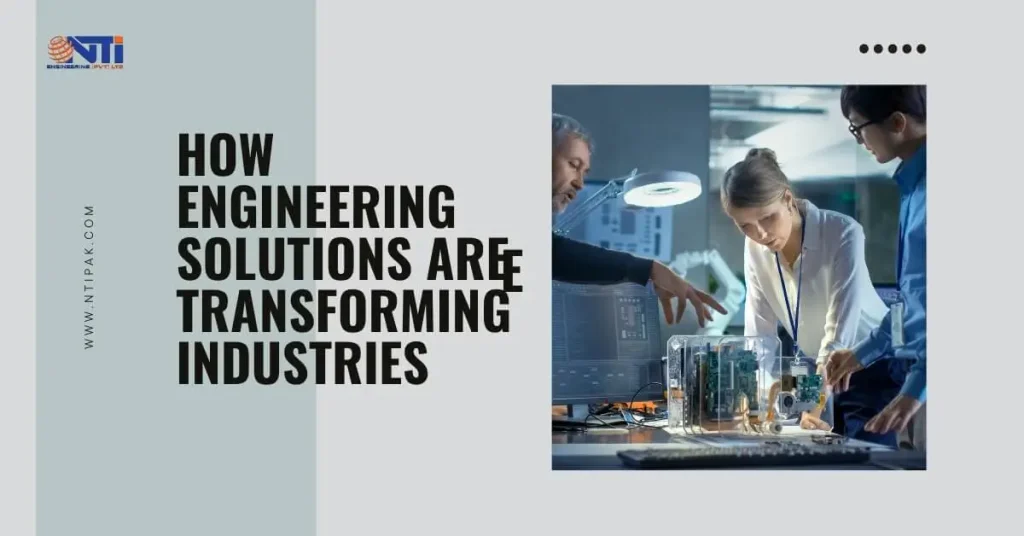Engineering has been the driving force behind some of humanity’s most impressive achievements—from the awe-inspiring pyramids of Egypt to today’s cutting-edge space exploration. As technology advances at an unprecedented pace, the field of engineering continues to evolve, shaping the world around us in ways we could have only dreamed of a few decades ago.
In this article, we’ll explore the key trends that are revolutionizing engineering today, the impact these innovations are having across various industries, and the challenges that engineers must tackle to lead us into the future.
Key Trends Shaping Engineering
Engineering is at the heart of modern innovation, with several key trends pushing the boundaries of what’s possible. These trends are transforming industries and opening up new possibilities across the board.
1. Artificial Intelligence and Machine Learning (AI/ML)

In 2024, AI and ML are driving change across industries by automating processes, optimizing designs, and providing predictive insights. AI-powered tools allow engineers to come up with innovative solutions, while machine learning helps predict failures and optimize maintenance—making engineering smarter and more efficient.
2. Internet of Things (IoT)

IoT is revolutionizing how engineers manage and interact with physical assets. By enabling real-time data collection and remote monitoring, IoT improves engineering projects’ safety, efficiency, and cost-effectiveness. It’s transforming industries, from manufacturing to infrastructure and bringing new levels of precision to the table.
3. Robotics and Automation

Robotics is no longer limited to factory floors. Today, automated systems are being deployed in construction, healthcare, and more. Engineers are using robotics to perform tasks that were once dangerous or monotonous, improving productivity and reducing human error.
4. 3D Printing

Engineers are increasingly relying on 3D printing for rapid prototyping and the creation of complex components. This technology allows for customization, faster development cycles, and less waste, which are all crucial in today’s fast-paced engineering environments.
5. Building Information Modeling (BIM)

BIM is transforming the construction industry by offering a digital representation of a building’s physical and functional characteristics. This technology helps engineers visualize designs, identify potential conflicts early, and improve project collaboration—leading to more efficient, cost-effective, and well-managed projects.
6. Sustainable Engineering

Sustainability is a major focus for today’s engineers. With rising environmental concerns, engineers are working to integrate renewable energy sources, eco-friendly materials, and energy-efficient designs into their projects. The goal is not only to innovate but to do so in a way that benefits the planet.
7. Data Analytics and Big Data

The ability to analyze large datasets is proving invaluable in engineering. By using data analytics, engineers can gain insights into system performance, streamline processes, and make more informed, data-driven decisions, further enhancing efficiency and innovation.
Impact of Engineering Solutions on Industries
The engineering innovations mentioned above are driving change across industries, with significant improvements in efficiency, safety, and sustainability.
1. Manufacturing
Modern engineering has completely transformed manufacturing processes. Automation, AI, and robotics are helping create smart factories that operate with greater precision and efficiency than ever before, reducing costs and improving the quality of products.
2. Construction
Advances in construction engineering, particularly through BIM and new materials, are making it possible to build more sustainable and resilient structures. Automation also reduces the time and costs associated with traditional construction methods, improving safety and project outcomes.
3. Transportation
From electric vehicles to high-speed trains, engineering is revolutionizing transportation by making it cleaner, faster, and more efficient. These innovations are reducing emissions and shaping the future of global transport.
4. Healthcare
Biomedical engineering is making waves in healthcare, with the development of cutting-edge medical devices, diagnostics, and treatment methods. From life-saving imaging technologies to advanced prosthetics, engineers play a key role in improving patient care and outcomes.
5. Energy
The energy sector is undergoing a significant transformation, thanks to engineering solutions that focus on renewable energy, storage technologies, and energy-efficient systems. Engineers are leading the charge toward a more sustainable energy future, addressing the global energy crisis, and working to reduce carbon emissions.
6. Technology
Engineering is the backbone of technological advancement. Whether it’s the development of the next generation of electronics, software, or AI applications, engineers are behind the innovations shaping the digital world.
Challenges and Opportunities
With all this progress comes a new set of challenges. Engineers today face obstacles that require creative problem-solving and strategic thinking:
1. Ethical Considerations
As new technologies emerge, ethical concerns such as job displacement, privacy, and bias come to the forefront. Engineers must navigate these issues with care, ensuring that their innovations benefit society without causing unintended harm.
2. Skill Gap
The rapid pace of technological advancement has created a skills gap in the industry. Engineers must continuously learn and adapt to new tools and technologies, especially in areas like AI, robotics, and IoT.
3. Integration and Interoperability
One of the greatest challenges is integrating new technologies into existing systems. Ensuring seamless interoperability between traditional infrastructure and modern solutions is essential for maximizing the potential of engineering innovations.
4. Cost and Investment
Developing and implementing cutting-edge engineering solutions often requires significant investment. Companies must carefully assess the long-term benefits against the upfront costs to ensure sustainable growth and innovation.
Despite these challenges, the opportunities are vast. Engineers are uniquely positioned to drive innovation, improve efficiency, and create a more sustainable future for all of us.
Conclusion
Engineering solutions are not only transforming industries but also shaping the future in ways that impact all aspects of modern life. From smarter factories and greener buildings to more advanced healthcare and cleaner energy, the work of engineers is all around us. The key to unlocking even greater potential lies in embracing new technologies, addressing emerging challenges, and continuously pushing the boundaries of what’s possible.
At NTI Engineering Private Limited, we provide innovative engineering solutions to help your business thrive. Let us be your trusted partner in driving growth and success through expert consultancy services.

